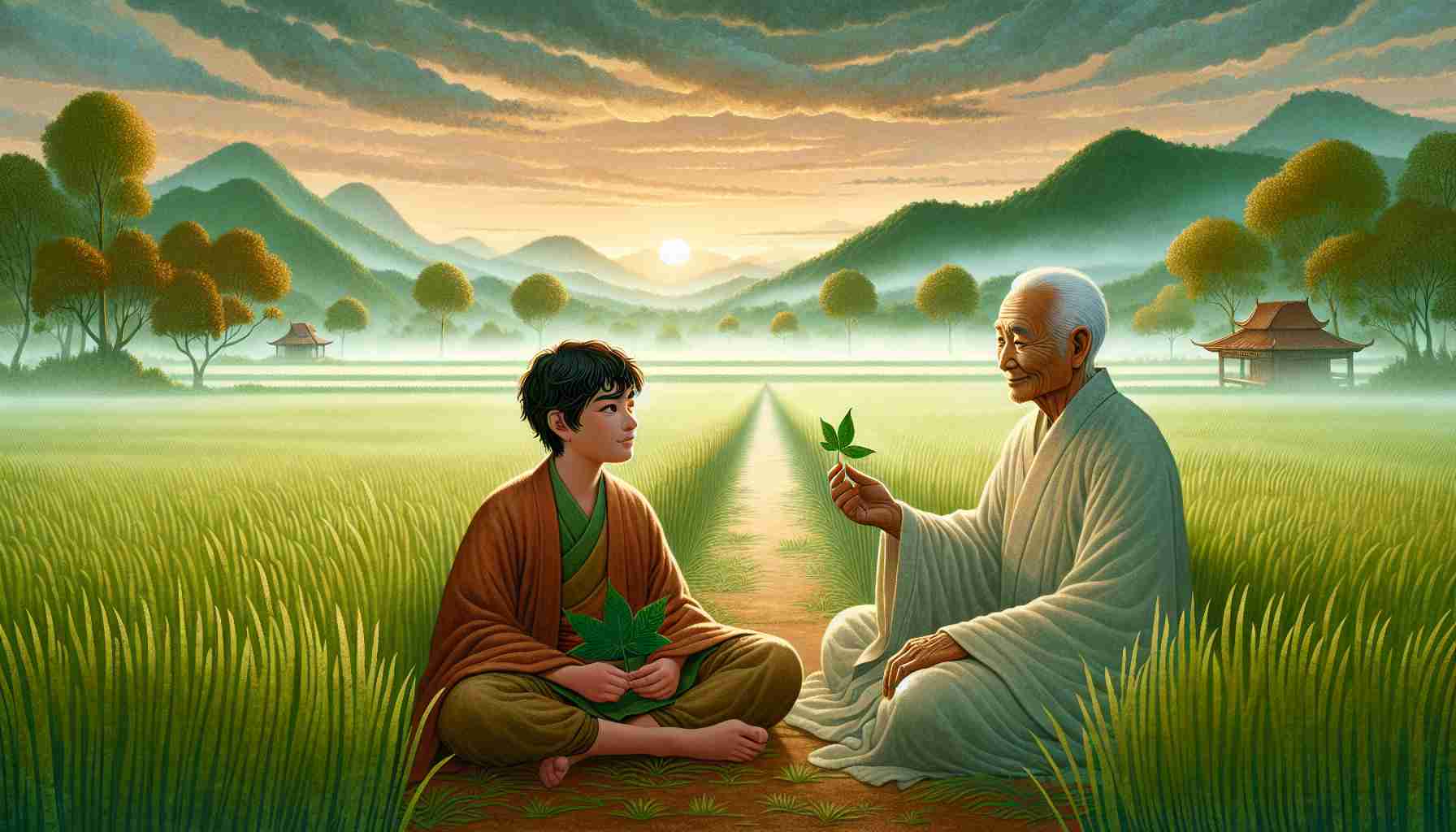

The rain had been falling for days. I stood at the edge of the rice field, watching the small streams of water run between the rows. I had tried everything—digging deeper, planting faster, working harder—but nothing seemed to make the crops grow any quicker.
My name is Fei. I was fourteen and proud to work beside my father and uncles. But that season, nothing went as planned. Every morning, I rushed to the fields with new ideas, hoping to fix everything. Still, the rice stayed slow.
One evening, tired and muddy, I sat beside Old Wei, a man who lived alone at the foot of the mountain. Some whispered that he was once a great scholar. Others said he spoke with the wind. All I knew was that he always seemed peaceful, even when nothing else was.
“Why do you sit here and do nothing?” I asked. “The rain is ruining everything. I keep trying, but the rice won’t grow.”
Old Wei smiled. Not in a big way—just a small, soft turning of the lips. “Do you think the rice grows because you try harder?”
I huffed. “If I don't work hard, the crop will fail. Isn’t that true?”
He picked up a fallen leaf floating on the puddle near his feet. “This leaf doesn’t try to float. It just does. It moves with the wind, with the water. That is how the Tao moves.”
“The Tao?” I asked, leaning in.
“The Tao is the Way,” he said gently. “It flows like the river. It goes where it needs to. Wu Wei means ‘non-action,’ but it doesn’t mean doing nothing. It means not forcing.”
“Not forcing?” I was confused. “But how will anything get done?”
Old Wei handed me the leaf. “The strongest trees bend with the wind. They do not fight it.”
That night, I lay in bed turning his words over in my mind.
The next day, I went to the field. But this time, I worked slowly. I felt the mud under my feet. I placed the plants gently, not rushing to finish. I watched the water move through the field, instead of trying to push it. I let myself go with the rhythm.
Days passed. The sky cleared. The rice began to grow—green and tall, just like before.
I still worked. But now, I worked with the land, not against it.
One afternoon, Old Wei walked past and nodded. “You are beginning to see.”
“Not fully,” I said with a smile. “But I feel a little quieter inside.”
And I did.
Since then, whenever I feel the urge to rush or fix everything, I remember the leaf on the water. I try not to force. I try to flow.
I didn’t change all at once. But now, I understand: the Tao is not about doing more. It’s about being in harmony.
And sometimes, the quiet way is the strongest way of all.
The rain had been falling for days. I stood at the edge of the rice field, watching the small streams of water run between the rows. I had tried everything—digging deeper, planting faster, working harder—but nothing seemed to make the crops grow any quicker.
My name is Fei. I was fourteen and proud to work beside my father and uncles. But that season, nothing went as planned. Every morning, I rushed to the fields with new ideas, hoping to fix everything. Still, the rice stayed slow.
One evening, tired and muddy, I sat beside Old Wei, a man who lived alone at the foot of the mountain. Some whispered that he was once a great scholar. Others said he spoke with the wind. All I knew was that he always seemed peaceful, even when nothing else was.
“Why do you sit here and do nothing?” I asked. “The rain is ruining everything. I keep trying, but the rice won’t grow.”
Old Wei smiled. Not in a big way—just a small, soft turning of the lips. “Do you think the rice grows because you try harder?”
I huffed. “If I don't work hard, the crop will fail. Isn’t that true?”
He picked up a fallen leaf floating on the puddle near his feet. “This leaf doesn’t try to float. It just does. It moves with the wind, with the water. That is how the Tao moves.”
“The Tao?” I asked, leaning in.
“The Tao is the Way,” he said gently. “It flows like the river. It goes where it needs to. Wu Wei means ‘non-action,’ but it doesn’t mean doing nothing. It means not forcing.”
“Not forcing?” I was confused. “But how will anything get done?”
Old Wei handed me the leaf. “The strongest trees bend with the wind. They do not fight it.”
That night, I lay in bed turning his words over in my mind.
The next day, I went to the field. But this time, I worked slowly. I felt the mud under my feet. I placed the plants gently, not rushing to finish. I watched the water move through the field, instead of trying to push it. I let myself go with the rhythm.
Days passed. The sky cleared. The rice began to grow—green and tall, just like before.
I still worked. But now, I worked with the land, not against it.
One afternoon, Old Wei walked past and nodded. “You are beginning to see.”
“Not fully,” I said with a smile. “But I feel a little quieter inside.”
And I did.
Since then, whenever I feel the urge to rush or fix everything, I remember the leaf on the water. I try not to force. I try to flow.
I didn’t change all at once. But now, I understand: the Tao is not about doing more. It’s about being in harmony.
And sometimes, the quiet way is the strongest way of all.